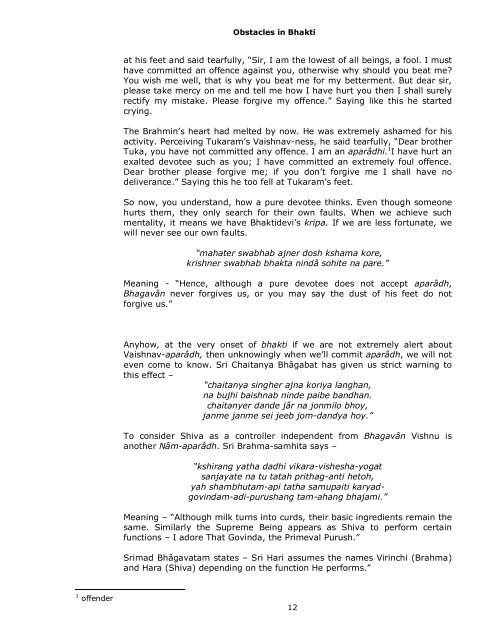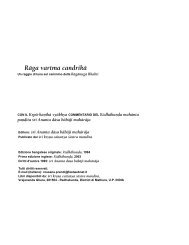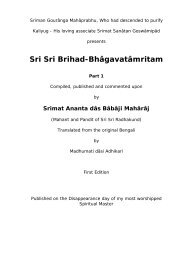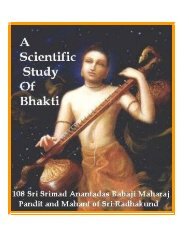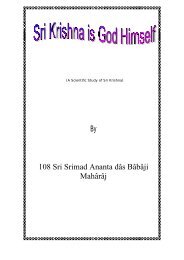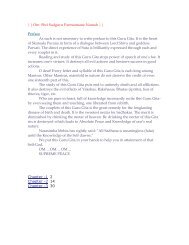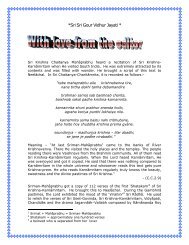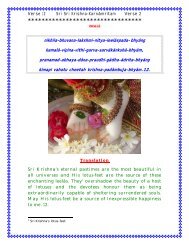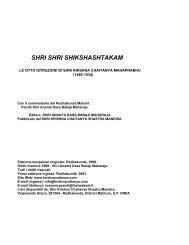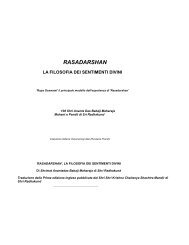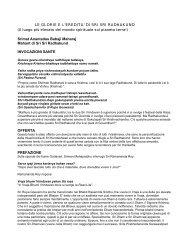Obstacles Bhakti - Kunjeshwari Home
Obstacles Bhakti - Kunjeshwari Home
Obstacles Bhakti - Kunjeshwari Home
Create successful ePaper yourself
Turn your PDF publications into a flip-book with our unique Google optimized e-Paper software.
1 offender<br />
<strong>Obstacles</strong> in <strong>Bhakti</strong><br />
at his feet and said tearfully, “Sir, I am the lowest of all beings, a fool. I must<br />
have committed an offence against you, otherwise why should you beat me?<br />
You wish me well, that is why you beat me for my betterment. But dear sir,<br />
please take mercy on me and tell me how I have hurt you then I shall surely<br />
rectify my mistake. Please forgive my offence.” Saying like this he started<br />
crying.<br />
The Brahmin’s heart had melted by now. He was extremely ashamed for his<br />
activity. Perceiving Tukaram’s Vaishnav-ness, he said tearfully, “Dear brother<br />
Tuka, you have not committed any offence. I am an aparâdhi. 1 I have hurt an<br />
exalted devotee such as you; I have committed an extremely foul offence.<br />
Dear brother please forgive me; if you don’t forgive me I shall have no<br />
deliverance.” Saying this he too fell at Tukaram’s feet.<br />
So now, you understand, how a pure devotee thinks. Even though someone<br />
hurts them, they only search for their own faults. When we achieve such<br />
mentality, it means we have <strong>Bhakti</strong>devi’s kripa. If we are less fortunate, we<br />
will never see our own faults.<br />
“mahater swabhab ajner dosh kshama kore,<br />
krishner swabhab bhakta nindâ sohite na pare.”<br />
Meaning - “Hence, although a pure devotee does not accept aparâdh,<br />
Bhagavân never forgives us, or you may say the dust of his feet do not<br />
forgive us.”<br />
Anyhow, at the very onset of bhakti if we are not extremely alert about<br />
Vaishnav-aparâdh, then unknowingly when we’ll commit aparâdh, we will not<br />
even come to know. Sri Chaitanya Bhâgabat has given us strict warning to<br />
this effect –<br />
“chaitanya singher ajna koriya langhan,<br />
na bujhi baishnab ninde paibe bandhan.<br />
chaitanyer dande jâr na jonmilo bhoy,<br />
janme janme sei jeeb jom-dandya hoy.”<br />
To consider Shiva as a controller independent from Bhagavân Vishnu is<br />
another Nâm-aparâdh. Sri Brahma-samhita says –<br />
“kshirang yatha dadhi vikara-vishesha-yogat<br />
sanjayate na tu tatah prithag-anti hetoh,<br />
yah shambhutam-api tatha samupaiti karyad-<br />
govindam-adi-purushang tam-ahang bhajami.”<br />
Meaning – “Although milk turns into curds, their basic ingredients remain the<br />
same. Similarly the Supreme Being appears as Shiva to perform certain<br />
functions – I adore That Govinda, the Primeval Purush.”<br />
Srimad Bhâgavatam states – Sri Hari assumes the names Virinchi (Brahma)<br />
and Hara (Shiva) depending on the function He performs.”<br />
12


